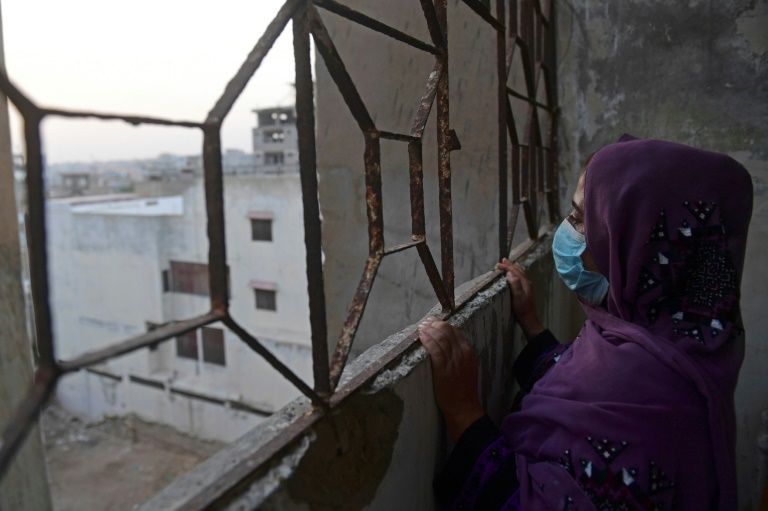Balochistan: Pakistan’s land of the disappeared
Hani Baloch says she and her fiance — both from Balochistan — were snatched from the street, then held and tortured by Pakistan’s security services. ©AFP –
Karachi (AFP) – Hani Baloch and her fiance Nasim never thought of themselves as dissidents, but one day in May — just weeks before their wedding — the students were snatched by armed and hooded men she says were from Pakistan’s security services.
The men accused the couple of being part of a terrorist organisation from Balochistan, the vast, mineral-rich southern province where the military is fighting a low-level insurgency, Hani said.
Speaking from her small apartment in the megacity of Karachi — just 25 kilometres (15 miles) from the province’s border — Hani told AFP how they were whisked off to a secret jail.
“They tortured us, they electrocuted us… they hit me in my head with a rifle butt,” the 27-year-old said.
The couple comes from Balochistan, but Hani denies they had any links to anti-government groups.
“All our students, teachers, lawyers, doctors — all those who are educated, all our intelligent youngsters — are being picked up,” she added.
Hani was released after three months, but no-one has heard from Nasim.
“They took everything from me,” she said of her uncertain future.
Activists say similar desperate accounts are common in Balochistan where they accuse shadowy security agents of kidnapping or “disappearing” thousands of people over the years.
The military refused to comment, referring AFP to a commission set up to investigate disappearances, which did not respond to requests for interview.
– Resentment and bombings –
Home to roughly seven million people, Balochistan is poor despite its natural resources — a source of great anger to residents who complain they don’t receive a fair share of the gas and mineral wealth.
While some groups back negotiations with the government to gain more rights, a separatist movement — including militant groups — is fighting for independence.
Resentment has been fuelled by billions of dollars of Chinese money flowing into the region through the China-Pakistan Economic Corridor (CPEC) — a key part of China’s Belt and Road Initiative — which locals say gave them little benefit as most new jobs went to outsiders.
Disappearances have increased in recent years, activists say, at the same time as militants have launched a string of attacks aimed at undermining Chinese investment — including an assault on Bejing’s consulate in Karachi in 2018.
Last year gunmen stormed a luxury hotel overlooking a flagship CPEC project — the deep-water seaport in Gwadar that gives China strategic access to the Arabian Sea — killing at least eight people.
And in June, Baloch insurgents targeted the Pakistan Stock Exchange, which is partly owned by Chinese companies.
All the attacks were claimed by the Balochistan Liberation Army.
Mama Qadeer, whose group Voice for Baloch Missing Persons, has offices across the province, said when Chinese interests were attacked it provoked a particularly strong reaction.
“In retaliation, they kill the ones they have in their jails — even if they have nothing to do with the insurgency,” he said.
“We start finding more mutilated bodies.”
– Thousands missing –
Qadeer said his son disappeared in 2010 and his body was found a year later on a vacant lot near the Iranian border, covered with burn marks and his arms broken.
His group claims some 55,000 people have been kidnapped and 18,000 bodies later found since 2000 — figures Pakistani officials dispute.
Only 155 people are missing in Balochistan, according to a recent federal government inquiry into enforced disappearances.
The commission’s president did not respond to multiple interview requests.
The findings were “insulting”, said lawmaker Akhtar Mengal, who described how almost every Baloch family has a missing relative.
“Women don’t know if they’re married or widowed. Children don’t know if they still have a father,” said the politician, whose older brother went missing in 1976.
Mengal’s party withdrew from Prime Minister Imran Khan’s ruling coalition this year to protest against the lack of action on disappearances.
The party had sent a list of 5,128 missing people to authorities in mid-2018. Of these, 450 have since been freed — but another 1,500 people vanished during the same period, Mengal said.
In a rare statement issued last year, the army said: “Not every person missing is attributable to (the) state.”
Still, a UN report in June found that Pakistan has a long history of enforced disappearances with thousands of unresolved cases.
“Many… have targeted human rights and minority defenders critical of the government and the military, as well as persons suspected or accused of involvement in the opposition,” it said.
A proposed law aiming to clamp down on enforced disappearances was floated nearly two years ago, but a vote on the issue seems unlikely given Khan’s strong army ties.
Still, human rights Minister Shireen Mazari recently said on Twitter that “No one should ‘disappear’ in a democracy.”
Opposition leader Maryam Nawaz, daughter of former prime minister Nawaz Sharif, recently criticised the government for not doing enough on the issue after meeting Hasseeba Qambrani in Quetta, the capital of Balochistan province.
One of Qambrani’s brothers, along with a cousin, were kidnapped in 2015. Their bodies were found a year later with torture marks, she said.
Another brother and cousin disappeared in February and have not been heard of since.
“If our people are guilty, they should produce them in court. We want the same rights as other citizens of Pakistan.”
“For years and years, we have been strong. But now we see no ray of light anymore,” she said.
Disclaimer: Validity of the above story is for 7 Days from original date of publishing. Source: AFP.


